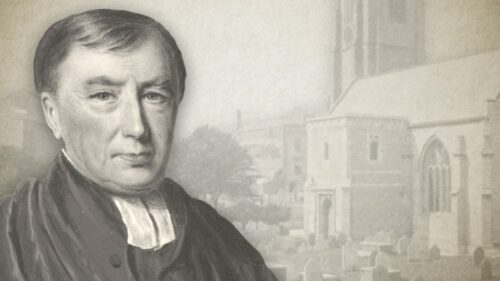
March 27—Morning Devotion
“The trumpet of the jubilee.”—Leviticus 15:9
My soul, pause over the subject of the jubilee trumpet; for surely much of gospel was proclaimed by it. It should seem that there were four distinct and special sounds of the trumpet in the camp of Israel. The trumpet of memorials, so called, (Levit. 23:24.) was blown on the occasion of the new moon, calling the people to the joyful assembly, Psalm lxxxi. 3. There was also the fast trumpet of which the prophet speaks, Joel ii. 1. Besides these, the war trumpet gave a certain sound to prepare to battle, 1 Cot. 14:8. And this of the jubilee, which differed from all. And although the jubilee trumpet was never heard but once in fifty years, yet so sweet and so distinguishing was the sound, that no poor captive among the servants in the camp of Israel, was at a moment’s loss to understand its gracious meaning. Say, my soul, is not the gospel sound, when first heard by the ear of faith, precisely the same? When pardon was first proclaimed to thee by the blood of Christ, and the day of his atonement so manifested to thy spiritual senses, that the captivity of sin and Satan lost their power upon thee, was not this indeed the jubilee trumpet, and the acceptable year of the Lord? Hast thou heard this joyful sound? Hath the Son of God made thee free? Hath Jesus caused thee to return to thy long-lost, longforfeited inheritance? And wilt thou never forget the unspeakable mercy? Hail, thou Almighty Deliverer, thou Redeemer of thy captives! I had sold my possession, sold myself for nought; and thou hast redeemed it for me again without money. I had sold it, indeed, but could not alienate it for ever, because the right of redemption was with thee. Yes, blessed Jesus, thou art he whom thy brethren shall praise. Thou art the next of kin, the nearest of all relations, and the dearest of all brothers. And thou hast redeemed both soul and body, both lands and inheritance by thy blood; and so redeemed the whole, as never more to be lost again, or forfeited for ever. And now, Lord, thy jubilee trumpet sounds; and the proclamation of the everlasting gospel is heard in our land, to give liberty to the captive, sight to the blind, to bring the prisoners out of the prison, and them that sit in darkness out of the prison-house. Oh, cause me to know the joyful sound, and daily to walk in the light of thy countenance. Cause me, by the sweet influences of thy Spirit, to live in the constant expectation of the year of the everlasting jubilee, when the trumpet of the archangel shall finally sound, and all thy redeemed shall then return to Zion with songs, and everlasting joy upon their heads; when they shall obtain joy and gladness, and sorrow and sighing shall flee away. Hallelujah.
Robert Hawker (1753-1827) was an Anglican (High-Calvinist) preacher who served as Vicar of Charles Church, Plymouth. John Hazelton wrote of him:
“The prominent features…in Robert Hawker's testimony…was the Person of Christ….Dr. Hawker delighted to speak of his Lord as "My most glorious Christ.” What anxious heart but finds at times in the perusal of the doctor's writings a measure of relief, a softening, and a mellowing? an almost imperceptible yet secret and constraining power in leading out of self and off from the misery and bondage of the flesh into a contemplation of the Person and preciousness of Christ as "the chiefest among ten thousand and the altogether lovely." Christ and Him crucified was emphatically the burden of his song and the keynote of his ministry. He preached his last sermon in Charles Church on March 18th, 1827, and on April 6th he died, after being six years curate and forty-three years vicar of the parish. On the last day of his life he repeated a part of Ephesians 1, from the 6th to the 12th verses, and as he proceeded he enlarged on the verses, but dwelt more fully on these words: "To the praise of His glory Who first trusted in Christ." He paused and asked, "Who first trusted in Christ?" And then made this answer: "It was God the Father Who first trusted in Christ."
Robert Hawker on the Biblical Covenants (Complete)
Robert Hawker's Poor Man's Morning Portions





